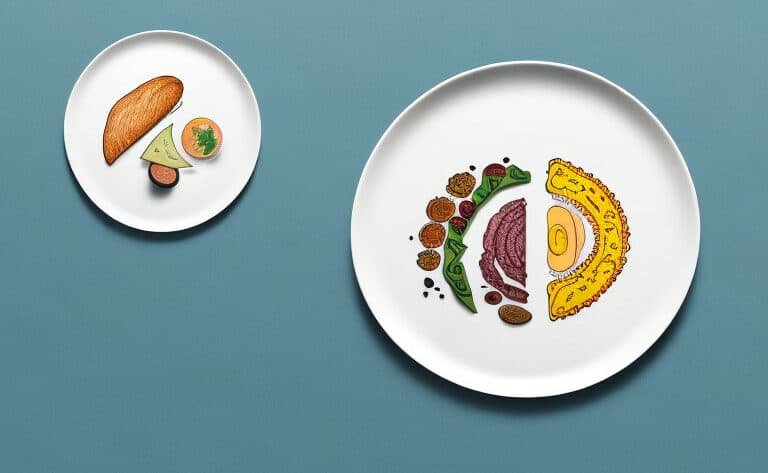Keto diet vs. Low Carb Diet
Are you wondering which diet is best for you between the keto diet and the low carb diet? Well, both of these diets are popular low carbohydrate diets, and their popularity continues to surge due to the observed benefits in weight loss and health improvement. In this article, we’ll look at the differences between these two diets, possible benefits, and drawbacks of each diet, weight loss, and how they influence athletic performance. Keep reading to find out more.
Understanding the Basics
Before diving deeper into the two diets, it’s vital to understand their basics. Both the keto diet and low carb diet have gained popularity in recent years due to their potential health benefits, including weight loss, improved blood sugar control, and increased energy levels.
What is the Keto Diet?
The ketogenic diet, also known as ‘keto,’ is a high-fat, low-carb diet that limits carbohydrate intake to force the body to burn fat as the primary source of fuel. The diet limits carbohydrates to a maximum of 50 grams per day, while fat intake can be as high as 75% of daily calorie intake. This means that foods high in carbohydrates, such as bread, pasta, and sugar, are limited, while foods high in fat, such as avocado, nuts, and cheese, are encouraged.
One of the main benefits of the keto diet is its ability to induce a state of ketosis in the body. Ketosis occurs when the body doesn’t have enough carbohydrates to burn for energy and instead starts breaking down fat into molecules called ketones, which the body can use for fuel. This can lead to rapid weight loss, as the body burns fat for energy instead of carbohydrates.
However, the keto diet can be challenging to follow, as it requires careful tracking of macronutrient intake and can be restrictive in terms of food choices. It’s important to consult a healthcare professional before starting the keto diet, especially if you have any underlying health conditions.
What is a Low Carb Diet?
A low-carb diet, as the name suggests, limits carbohydrate intake but doesn’t necessarily increase fat intake. The diet aims to restrict carbohydrate intake to less than 130 grams per day. This means that foods high in carbohydrates, such as bread, pasta, and rice, are limited, while foods high in protein, such as meat, fish, and eggs, are encouraged.
Like the keto diet, a low-carb diet can lead to weight loss and improved blood sugar control. However, it may not be as effective at inducing ketosis as the keto diet, as the body still has enough carbohydrates to burn for energy.
It’s important to note that not all carbohydrates are created equal. A low-carb diet can still include plenty of nutrient-dense carbohydrates, such as vegetables, fruits, and whole grains, while limiting refined carbohydrates, such as sugar and white flour.
Overall, both the keto diet and low carb diet can be effective for weight loss and improving health markers. However, it’s important to choose a diet that fits your individual needs and lifestyle, and to consult a healthcare professional before making any significant dietary changes.
Key Differences Between Keto and Low Carb Diets
Diets come in all shapes and sizes, and it’s important to understand the differences between them before embarking on a new eating plan. Two popular diets that often get confused are the keto diet and the low carb diet. While both diets restrict carbohydrate intake, they differ in their approach to macronutrient distribution, food choices, and the desired state of ketosis.
Macronutrient Distribution
One significant difference between the two diets is in the macronutrient distribution. The keto diet restricts carbohydrate intake to less than 50 grams per day, with a high-fat intake that ranges between 60% to 75%. This high-fat intake is essential to induce a state of ketosis, where the body relies on ketones produced from fat for energy. In contrast, a low carb diet restricts carbohydrate intake to less than 130 grams per day, but doesn’t necessarily require an increase in fat intake. Instead, a low carb diet may consist of increased protein and fat intake, with a lower overall percentage of fat than the keto diet.
Food Choices and Restrictions
Another primary difference is in the food choices and restrictions. The keto diet restricts carbohydrate intake to vegetables, nuts, seeds, and dairy products with low lactose content. Apart from these, the diet may include high-fat and low-carb foods such as meat, fish, oils, and avocado. These food choices are essential to maintain the state of ketosis. A low carb diet, on the other hand, may include high-carb fruits, starchy vegetables, and certain grains such as quinoa and brown rice, in addition to the foods allowed in the keto diet. This broader range of food choices may make it easier to adhere to a low carb diet in the long term.
Ketosis vs. Non-Ketosis
The keto diet aims to induce a state of ketosis, where the body relies on ketones produced from fat for energy. This state of ketosis has been shown to have a range of health benefits, including weight loss, improved blood sugar control, and increased energy levels. The low carb diet doesn’t aim to induce ketosis, and the body uses glucose as the primary source of energy. While the low carb diet may still lead to weight loss and improved blood sugar control, it may not provide the same range of health benefits as the keto diet.
Ultimately, the choice between the keto and low carb diets depends on individual preferences and health goals. Both diets can be effective for weight loss and improving overall health, but it’s important to consult with a healthcare professional before starting any new diet plan.
Benefits and Drawbacks of Each Diet
Choosing the right diet can be a daunting task, especially with so many options available. Two popular diets that have gained traction in recent years are the keto diet and the low carb diet. While both diets involve limiting carbohydrate intake, they differ in their approach and potential health benefits and drawbacks.
Health Benefits of the Keto Diet
The ketogenic diet is a high-fat, low-carb diet that has been shown to have several health benefits. One of the primary benefits is improved insulin sensitivity, which can help regulate blood sugar levels and reduce the risk of type 2 diabetes. The diet has also been shown to improve blood lipid levels, which can lower the risk of heart disease. Additionally, some studies suggest that the keto diet may reduce the risk of certain cancers and Alzheimer’s disease.
Another benefit of the keto diet is that it can lead to weight loss, particularly in individuals who are obese or overweight. When the body is in a state of ketosis, it burns fat for fuel instead of glucose, which can lead to a reduction in body fat.
Health Benefits of a Low-Carb Diet
Similar to the keto diet, a low carb diet also involves limiting carbohydrate intake. However, the focus is not on high fat intake but rather on increasing protein and healthy fat intake. The diet has been shown to improve blood sugar control and reduce the risk of heart disease by lowering blood pressure and improving blood lipid levels.
In addition, the low carb diet can lead to weight loss, particularly in individuals who are insulin resistant. By reducing carbohydrate intake, the body is forced to use stored fat for energy, which can lead to a reduction in body fat.
Potential Risks and Drawbacks of the Keto Diet
While the keto diet has several health benefits, it also has some potential risks and drawbacks. One of the primary concerns with the diet is the risk of nutrient deficiencies. Since the diet limits certain food groups, such as fruits and vegetables, individuals may not be getting enough vitamins and minerals, including magnesium, potassium, and vitamins C and K.
Another potential drawback of the keto diet is gastrointestinal discomfort. The high fat intake can cause digestive issues, such as constipation, bloating, and diarrhea. Additionally, individuals with certain genetic predispositions may be at an increased risk of heart disease due to the high fat intake.
Potential Risks and Drawbacks of a Low Carb Diet
Like the keto diet, a low carb diet also has some potential risks and drawbacks. One of the primary concerns with the diet is the risk of kidney stones. Since the diet involves a higher intake of fat, there is an increased risk of developing kidney stones, particularly in individuals who are prone to them.
In addition, high protein intake can lead to kidney damage in individuals with pre-existing kidney problems. It is important for individuals with kidney problems to consult with a healthcare provider before starting a low carb diet.
Overall, both the keto diet and the low carb diet have their benefits and drawbacks. It is important to consult with a healthcare provider before starting any new diet to determine if it is appropriate for your individual needs and health goals.
Weight Loss and Performance
Weight loss and performance are two important aspects of maintaining a healthy lifestyle. While there are many diets out there that claim to help with both, the keto diet and low carb diet have gained popularity in recent years. Let’s take a closer look at how these diets impact weight loss and athletic performance.
Keto Diet and Weight Loss
The keto diet is a high-fat, low-carbohydrate diet that has been found to be effective in short-term weight loss. This is due to the limited calorie intake from the low carbohydrate intake. Individuals may also experience reduced hunger and increased satiety, leading to reduced overall calorie intake. However, long-term studies are still scarce and the sustainability of this diet is still under scrutiny.
While the keto diet may be effective in the short term, it is important to note that it may not be sustainable in the long term. The restricted carbohydrate intake may lead to nutrient deficiencies and potential health risks. It is always advisable to consult with a registered dietitian before embarking on any new diet plan.
Low Carb Diet and Weight Loss
The low carb diet is another popular diet for weight loss. It has been found to be effective in both short-term and long-term weight loss, with potentially faster weight loss and better adherence rates than a low-fat diet. The low carb diet focuses on reducing carbohydrate intake and increasing protein and fat intake.
Studies have shown that the low carb diet may be more effective in weight loss than a low-fat diet. This is due to the fact that reducing carbohydrate intake leads to lower insulin levels, which in turn leads to fat loss. However, it is important to note that the sustainability of this diet is still under scrutiny and it may not be suitable for everyone.
Athletic Performance on Keto vs. Low Carb Diets
Athletic performance is another important aspect to consider when choosing a diet. The lack of carbohydrate intake in the keto diet may reduce exercise performance, especially in high-intensity activities that require bursts of energy. This is because carbohydrates are the body’s preferred source of energy during exercise. The low carb diet, on the other hand, may improve endurance performance and reduce time to exhaustion.
It is important to note that every individual is different and may respond differently to different diets. It is always advisable to consult with a registered dietitian and a healthcare professional before embarking on any new diet plan.
Conclusion
Both the keto diet and the low carb diet have their benefits and drawbacks, and the choice between the two depends on individual preferences, health status, and fitness goals. It’s essential to consult with a medical professional before starting any new diet to ensure it’s safe and appropriate for you.





